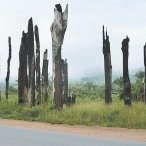English · Español

21 April 2011 | News | Human rights | Social activists at risk | Food Sovereignty
Living memory
Interview with Ayala Ferreira (MST): Challenges 15 years after peasant massacre in Brazil
Download: MP3 (1.8 Mb)
As part of the events to mark the International Day of Peasant Struggle we interviewed Ayala Ferreira. She is a member of the National Coordination of the Rural Landless Workers’ Movement of Brazil (MST), in Para state, near Eldorado dos Carajas, where a massacre took place fifteen years ago that would turn every 17 of April in a day of struggle and commemoration.
“The best way to remember the massacre of our fellow peasants is to continue the struggle. This results in the fact that today there are peasant settlers that produce, study and work for an Agrarian Reform in our country”, said the leader of the MST in Para.
“The children back then are now adults who continue fighting and remembering their parents and friends”. The massacre left 19 peasants dead and hundreds injured by police and military officers.
Only three of the officers have been tried, although they are free waiting for their conviction. Some others have been honored by the state.
Ayala said that the emergency in Brazil as a world power has strong contradictions, like for instance being one of the most unfair countries in terms of distribution of wealth.
The MST analyzes that there are two conflicting models in the rural area.
On the one hand agribusiness, which the Brazilian state seems to be promoting together with foreign and local corporations. On the other hand the democratization of land through an Agrarian Reform that includes productive, political and cultural aspects that favor the majority of the rural population.
This may be achieved through mobilization and lobbying the Brazilian government to implement public policies. Also by means of the constant creation of alliances with other rural and urban organizations, such as student and workers organizations, like the Latin American Coordinator of Rural Organizations (CLOC) and La Via Campesina.
The contradictions of Brazil lead to the lack of courage and conditions to carry out the necessary reforms such as the agrarian reform, a health reform and a cultural reform”, explained Ayala. Thus the need for a social movement in the rural and urban areas with clear demands that pressure the government and the political sector.
She concluded by saying “we are aware that the goals of the working class are fair and that they will prevail. Our task is to continue resisting and fighting for a fairer, nicer and more equal world. Until the victory”.
Photo: Sculpture in the site of the massacre (Brasil de Fato)







